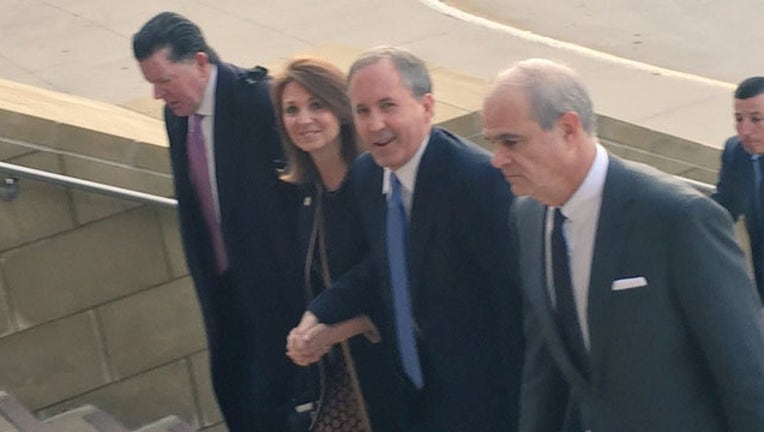Texas AG Ken Paxton asks judge to toss charges

McKINNEY, Texas - Texas Attorney General Ken Paxton returned to court Tuesday on securities fraud charges that have troubled his first year in office and will likely drag well into 2016 unless a judge now sides with his long list of reasons to throw out the case.
Paxton, a conservative Republican who was indicted in July, entered the suburban Dallas courthouse flanked by his wife and greeted by more than a dozen supporters, one of whom clutched a Bible in the gallery. They huddled in the hallway to pray for the tea party favorite during the first significant hearing since Paxton was booked and quickly released this summer.
The state's top prosecutor has pleaded not guilty to charges of deceiving wealthy investors in 2011, when he was still a state legislator. Paxton sat quietly at the defense table while his platoon of high-powered attorneys tried persuading a judge to dismiss the charges, accusing secret grand jury proceedings of being compromised and questioning whether special prosecutors understood complex securities law.
State District Judge George Gallagher did not indicate when he would rule.
"One law for him, one law for everybody else. That's their argument," special prosecutor Ken Schaffer said.
One Paxton supporter in the gallery clapped when Schaffer alluded to Paxton filing six lawsuits against the Obama administration since taking office in January.
Paxton, 52, has sustained support within his conservative base despite the criminal charges. Other top Texas Republican leaders -- including Gov. Greg Abbott, Paxton's predecessor as attorney general -- have not publicly criticized Paxton and have urged the legal system to play out.
"I have confidence in this process, the people of this county and the truth," Paxton told reporters before leaving the courthouse in his hometown of McKinney.
Most serious are accusations that Paxton encouraged investors, including a fellow Texas lawmaker, to pump money into the tech startup Servergy Inc. without telling them that he was being compensated by the company. If convicted, he faces five to 99 years in prison.
Schaffer, usually a Houston defense attorney whose high-profile clients have included actress Farrah Fawcett and former Texas tycoon Allen Stanford, cast a long stare at Paxton and pointed his finger while chastising him for allegedly violating the very securities law that the former state representative voted to amend. Paxton kept looking straight ahead.
Taken up by the Texas Legislature in the wake of the Enron scandal, the law made it a felony to act as an investment adviser representative without registering with state regulators. Last year, in the middle of an intense Republican primary race, Paxton admitted to violating the law and paid a $1,000 fine.
One securities lawyer told the Texas Lawbook, an industry publication, in August that the admission made it a "slam dunk case" for prosecutors. The attorney was Bill Mateja -- whom Paxton has since hired.
Mateja told the court he didn't know then what he knows now, which is that Paxton would not have needed to register because he was covered under federal securities law. Special prosecutors pushed back but said that, regardless, a jury should decide at trial and not a judge beforehand.
But Paxton's attorneys say the indictments were tainted from the start. They accused a judge of improperly picking the grand jury by asking for volunteers -- during a time when the investigation into Paxton was getting intense publicity -- and potentially interfering with deliberations.
"Unless this grand jury was living in a cave in Bora Bora, they must have had some idea what they were sitting on," Paxton attorney Dan Cogdell said.
Special prosecutors asked the judge to reject Paxton's request for transcripts and recordings from the grand jury proceedings.

